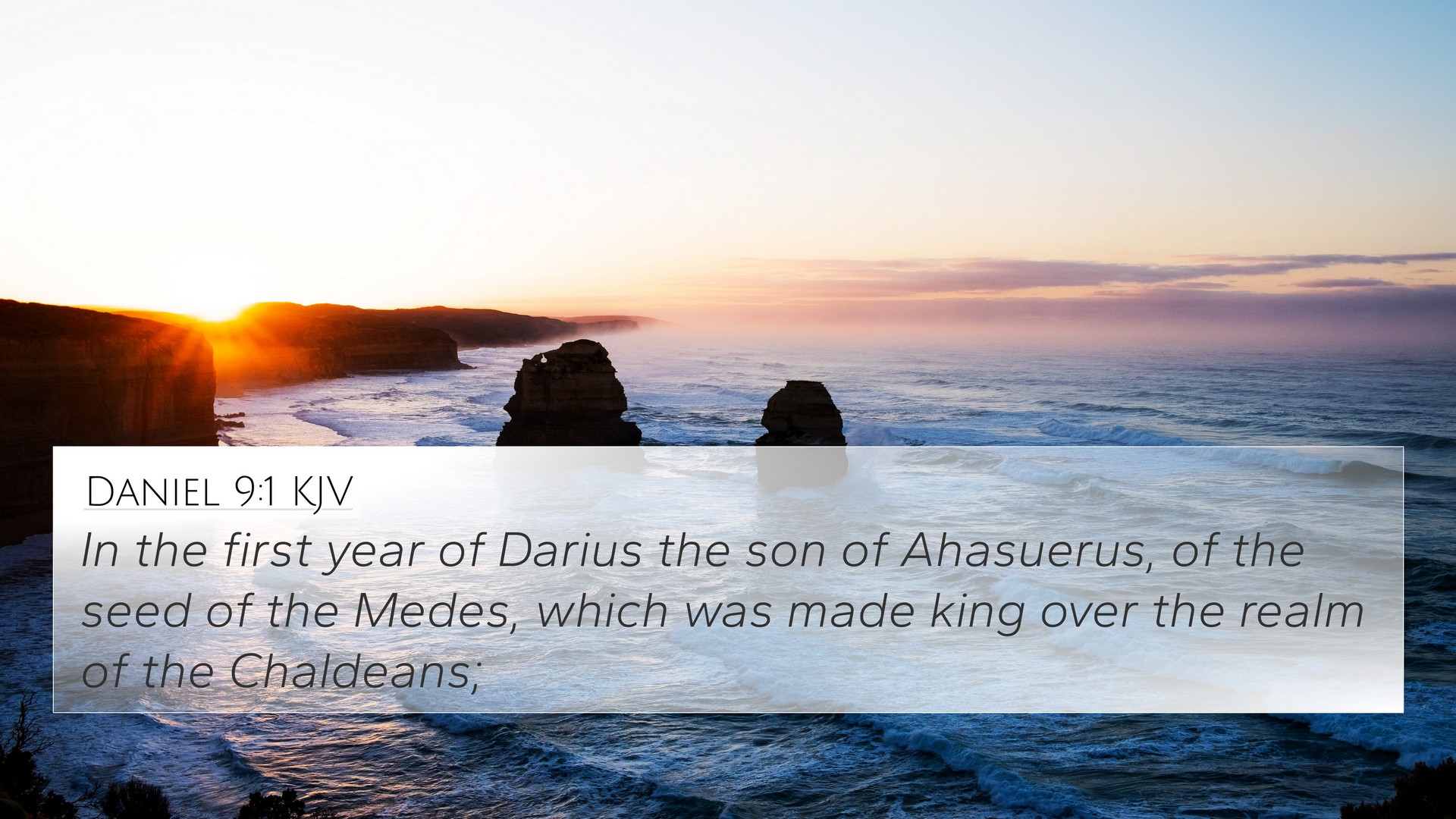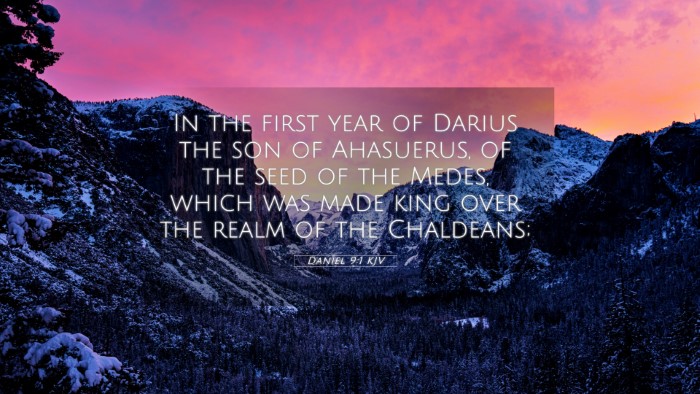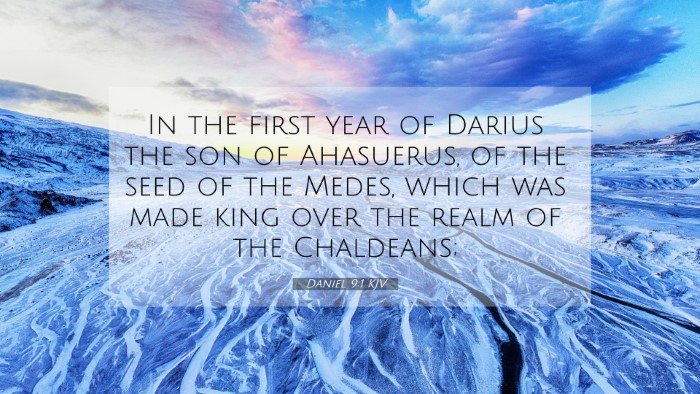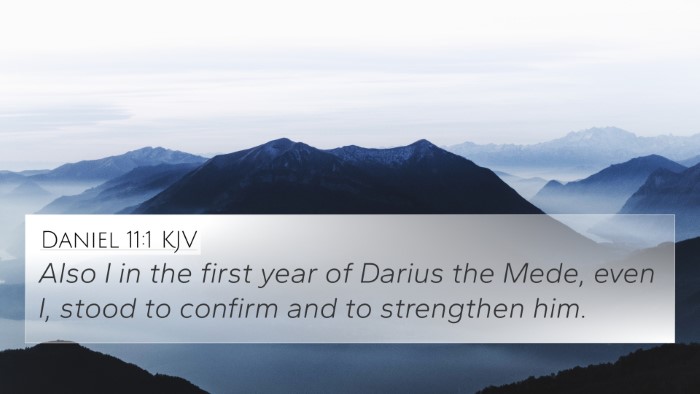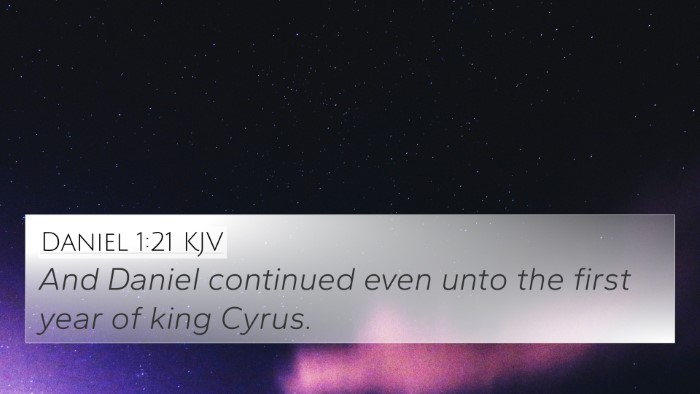Understanding Daniel 9:1
Daniel 9:1 is a significant verse within the Book of Daniel, which serves as a prelude to the prophet's fervent prayer and confession on behalf of Israel. This analysis will draw insights from established public domain commentaries, including those of Matthew Henry, Albert Barnes, and Adam Clarke, and explore its meaning, context, and related Bible verses.
Context of Daniel 9:1
As we approach the interpretation of this verse, it is important to consider the historical context. Daniel 9:1 states:
"In the first year of Darius the son of Ahasuerus, of the seed of the Medes, which was made king over the realm of the Chaldeans..."
Historical Background
This verse places us in the first year of Darius the Mede, a critical time following the fall of Babylon. It represents a transition in leadership and highlights Daniel's status and response in prayer during turbulent times. As noted by Matthew Henry, this was a time of great concern for the Jewish exiles, as they yearned for restoration.
Theological Insights
- Prayer and Intercession: Daniel's immediate response to the political changes reinforces his role as an intercessor. Albert Barnes emphasizes that true leaders, like Daniel, prioritize prayer and seek divine guidance amid uncertainty.
- Fulfillment of Prophecy: Adam Clarke elaborates on how Daniel's actions were motivated by the prophecies of Jeremiah, indicating that he was deeply aware of God's timeline for Israel's restoration.
- Role of Divine Sovereignty: The mention of Darius' kingship affirms God's sovereignty over all nations and rulers. This reinforces a recurring theme in the Book of Daniel – God's control over history.
Cross-Referencing with Biblical Texts
Understanding Daniel 9:1 involves recognizing its connections with other scriptures that illuminate its themes and messages. Notably, we can identify several Bible verses that relate closely to this passage:
- Jeremiah 25:11-12: This verse pronounces the prophecy of Israel's 70-year desolation, which serves as the backdrop for Daniel's prayer.
- Daniel 9:2: Continuing from verse 1, Daniel explicitly seeks to understand the years God had ordained for the desolation of Jerusalem.
- Isaiah 44:28: This passage speaks of Cyrus, king of Persia, which ties into the shift of power and links back to the prophecies regarding the coming restoration.
- Ezra 1:1-4: Here we see the fulfillment of the prophecy as the exiles are permitted to return and rebuild, showcasing God's faithfulness to His Word.
- Romans 15:4: This New Testament verse reminds us that the scriptures were written for our instruction, which includes understanding the history and prophecy related to Israel.
- 2 Chronicles 36:22-23: This captures the charge given to Cyrus about rebuilding the temple, echoing themes of restoration from captivity.
- Psalms 137:1-4: This Psalm reflects the captivity of Israel and profoundly connects with Daniel’s burden for his people.
Thematic Connections
The themes derived from Daniel 9:1 also point to broader doctrinal concepts throughout the Scriptures.
- Intercession for Others: Daniel’s prayerful spirit evokes connections with other biblical figures, such as Moses (Exodus 32) and Paul (Romans 9:1-3), who also intercede on behalf of their people.
- Confession and Repentance: Similar to how Daniel confesses the sins of Israel, the theme of repentance runs throughout scripture, particularly in the prophetic books, exemplified in Nehemiah 1 and 1 John 1:9.
Conclusion
In conclusion, Daniel 9:1 serves as a foundation for understanding the importance of divine sovereignty in historical events, the power of prayer, and the hope of restoration through God’s promises. By linking this verse with other biblical texts, believers can see the continuity of God's plan for Israel and the world. The hermeneutical practice of cross-referencing enhances our understanding of scripture, allowing for deeper insights into its meanings and applications.
For those exploring bible verse cross-references, tools such as a bible concordance can facilitate an in-depth bible cross-reference guide for comprehensive study. By utilizing these resources, individuals can enrich their cross-referencing Bible study and gain further methods in bible reference resources to uncover the intricate connections between verses and key biblical themes.
